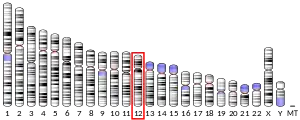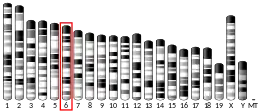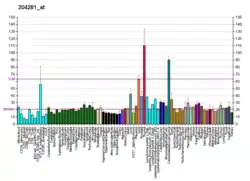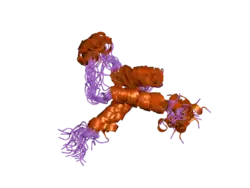| TEAD4 | |||||||||||||||||||||||||||||||||||||||||||||||||||
|---|---|---|---|---|---|---|---|---|---|---|---|---|---|---|---|---|---|---|---|---|---|---|---|---|---|---|---|---|---|---|---|---|---|---|---|---|---|---|---|---|---|---|---|---|---|---|---|---|---|---|---|
 | |||||||||||||||||||||||||||||||||||||||||||||||||||
| Identifiers | |||||||||||||||||||||||||||||||||||||||||||||||||||
| Aliases | TEAD4, EFTR-2, RTEF1, TCF13L1, TEF-3, TEF3, TEFR-1, hRTEF-1B, TEA domain transcription factor 4 | ||||||||||||||||||||||||||||||||||||||||||||||||||
| External IDs | OMIM: 601714 MGI: 106907 HomoloGene: 74463 GeneCards: TEAD4 | ||||||||||||||||||||||||||||||||||||||||||||||||||
| |||||||||||||||||||||||||||||||||||||||||||||||||||
| |||||||||||||||||||||||||||||||||||||||||||||||||||
| |||||||||||||||||||||||||||||||||||||||||||||||||||
| |||||||||||||||||||||||||||||||||||||||||||||||||||
| Wikidata | |||||||||||||||||||||||||||||||||||||||||||||||||||
| |||||||||||||||||||||||||||||||||||||||||||||||||||
Transcriptional enhancer factor TEF-3 is a protein that in humans is encoded by the TEAD4 gene.[5][6][7]
Function
This gene product is a member of the transcriptional enhancer factor (TEF) family of transcription factors, which contain the TEA/ATTS DNA-binding domain.[8] Members of the family in mammals are TEAD1, TEAD2, TEAD3, TEAD4. TEAD4 is preferentially expressed in the skeletal muscle, and binds to the M-CAT regulatory element found in promoters of muscle-specific genes to direct their gene expression. Alternatively spliced transcripts encoding distinct isoforms, some of which are translated through the use of a non-AUG (UUG) initiation codon, have been described for this gene.[7] Gene ablation experiments in mice (i.e. knockout mice) showed that TEAD4 is essential for the formation of blastocysts during preimplantation embryo development.[9][10] Although it was originally hypothesized to be essential for specification of trophectoderm lineage, it was later shown that functional trophectoderm can be produced leading to formation of blastocysts under in vitro conditions that suppress oxidative stress.[11] Transcriptional coregulators, such as WWTR1 (TAZ) bind to members in this transcription factor family.
References
- 1 2 3 GRCh38: Ensembl release 89: ENSG00000197905 - Ensembl, May 2017
- 1 2 3 GRCm38: Ensembl release 89: ENSMUSG00000030353 - Ensembl, May 2017
- ↑ "Human PubMed Reference:". National Center for Biotechnology Information, U.S. National Library of Medicine.
- ↑ "Mouse PubMed Reference:". National Center for Biotechnology Information, U.S. National Library of Medicine.
- ↑ Jacquemin P, Depetris D, Mattei MG, Martial JA, Davidson I (January 1999). "Localization of human transcription factor TEF-4 and TEF-5 (TEAD2, TEAD3) genes to chromosomes 19q13.3 and 6p21.2 using fluorescence in situ hybridization and radiation hybrid analysis". Genomics. 55 (1): 127–9. doi:10.1006/geno.1998.5628. hdl:2268/13836. PMID 9889009.
- ↑ Stewart AF, Richard CW, Suzow J, Stephan D, Weremowicz S, Morton CC, Adra CN (October 1996). "Cloning of human RTEF-1, a transcriptional enhancer factor-1-related gene preferentially expressed in skeletal muscle: evidence for an ancient multigene family". Genomics. 37 (1): 68–76. doi:10.1006/geno.1996.0522. PMID 8921372.
- 1 2 "Entrez Gene: TEAD4 TEA domain family member 4".
- ↑ Bürglin TR (July 1991). "The TEA domain: a novel, highly conserved DNA-binding motif". Cell. 66 (1): 11–2. doi:10.1016/0092-8674(91)90132-I. PMID 2070413. S2CID 2819591.
- ↑ Yagi R, Kohn MJ, Karavanova I, Kaneko KJ, Vullhorst D, DePamphilis ML, Buonanno A (November 2007). "Transcription factor TEAD4 specifies the trophectoderm lineage at the beginning of mammalian development". Development. 134 (21): 3827–36. doi:10.1242/dev.010223. PMID 17913785.
- ↑ Nishioka N, Yamamoto S, Kiyonari H, Sato H, Sawada A, Ota M, Nakao K, Sasaki H (2008). "Tead4 is required for specification of trophectoderm in pre-implantation mouse embryos". Mechanisms of Development. 125 (3–4): 270–83. doi:10.1016/j.mod.2007.11.002. PMID 18083014. S2CID 13898262.
- ↑ Kaneko KJ, DePamphilis ML (September 2013). "TEAD4 establishes the energy homeostasis essential for blastocoel formation". Development. 140 (17): 3680–90. doi:10.1242/dev.093799. PMC 3742148. PMID 23903192.
Further reading
- Maruyama K, Sugano S (January 1994). "Oligo-capping: a simple method to replace the cap structure of eukaryotic mRNAs with oligoribonucleotides". Gene. 138 (1–2): 171–4. doi:10.1016/0378-1119(94)90802-8. PMID 8125298.
- Hsu DK, Guo Y, Alberts GF, Copeland NG, Gilbert DJ, Jenkins NA, Peifley KA, Winkles JA (June 1996). "Identification of a murine TEF-1-related gene expressed after mitogenic stimulation of quiescent fibroblasts and during myogenic differentiation". The Journal of Biological Chemistry. 271 (23): 13786–95. doi:10.1074/jbc.271.23.13786. PMID 8662936.
- Jacquemin P, Hwang JJ, Martial JA, Dollé P, Davidson I (September 1996). "A novel family of developmentally regulated mammalian transcription factors containing the TEA/ATTS DNA binding domain". The Journal of Biological Chemistry. 271 (36): 21775–85. doi:10.1074/jbc.271.36.21775. PMID 8702974.
- Suzuki Y, Yoshitomo-Nakagawa K, Maruyama K, Suyama A, Sugano S (October 1997). "Construction and characterization of a full length-enriched and a 5'-end-enriched cDNA library". Gene. 200 (1–2): 149–56. doi:10.1016/S0378-1119(97)00411-3. PMID 9373149.
- Vaudin P, Delanoue R, Davidson I, Silber J, Zider A (November 1999). "TONDU (TDU), a novel human protein related to the product of vestigial (vg) gene of Drosophila melanogaster interacts with vertebrate TEF factors and substitutes for Vg function in wing formation". Development. 126 (21): 4807–16. doi:10.1242/dev.126.21.4807. PMID 10518497.
- Vassilev A, Kaneko KJ, Shu H, Zhao Y, DePamphilis ML (May 2001). "TEAD/TEF transcription factors utilize the activation domain of YAP65, a Src/Yes-associated protein localized in the cytoplasm". Genes & Development. 15 (10): 1229–41. doi:10.1101/gad.888601. PMC 313800. PMID 11358867.
- Chen HH, Baty CJ, Maeda T, Brooks S, Baker LC, Ueyama T, Gursoy E, Saba S, Salama G, London B, Stewart AF (November 2004). "Transcription enhancer factor-1-related factor-transgenic mice develop cardiac conduction defects associated with altered connexin phosphorylation". Circulation. 110 (19): 2980–7. doi:10.1161/01.CIR.0000146902.84099.26. PMID 15520314.
- Rual JF, Venkatesan K, Hao T, Hirozane-Kishikawa T, Dricot A, Li N, Berriz GF, Gibbons FD, Dreze M, Ayivi-Guedehoussou N, Klitgord N, Simon C, Boxem M, Milstein S, Rosenberg J, Goldberg DS, Zhang LV, Wong SL, Franklin G, Li S, Albala JS, Lim J, Fraughton C, Llamosas E, Cevik S, Bex C, Lamesch P, Sikorski RS, Vandenhaute J, Zoghbi HY, Smolyar A, Bosak S, Sequerra R, Doucette-Stamm L, Cusick ME, Hill DE, Roth FP, Vidal M (October 2005). "Towards a proteome-scale map of the human protein-protein interaction network". Nature. 437 (7062): 1173–8. Bibcode:2005Natur.437.1173R. doi:10.1038/nature04209. PMID 16189514. S2CID 4427026.
- Appukuttan B, McFarland TJ, Davies MH, Atchaneeyasakul LO, Zhang Y, Babra B, Pan Y, Rosenbaum JT, Acott T, Powers MR, Stout JT (August 2007). "Identification of novel alternatively spliced isoforms of RTEF-1 within human ocular vascular endothelial cells and murine retina". Investigative Ophthalmology & Visual Science. 48 (8): 3775–82. doi:10.1167/iovs.06-1172. PMID 17652751.
External links
- TEAD4+protein,+human at the U.S. National Library of Medicine Medical Subject Headings (MeSH)






